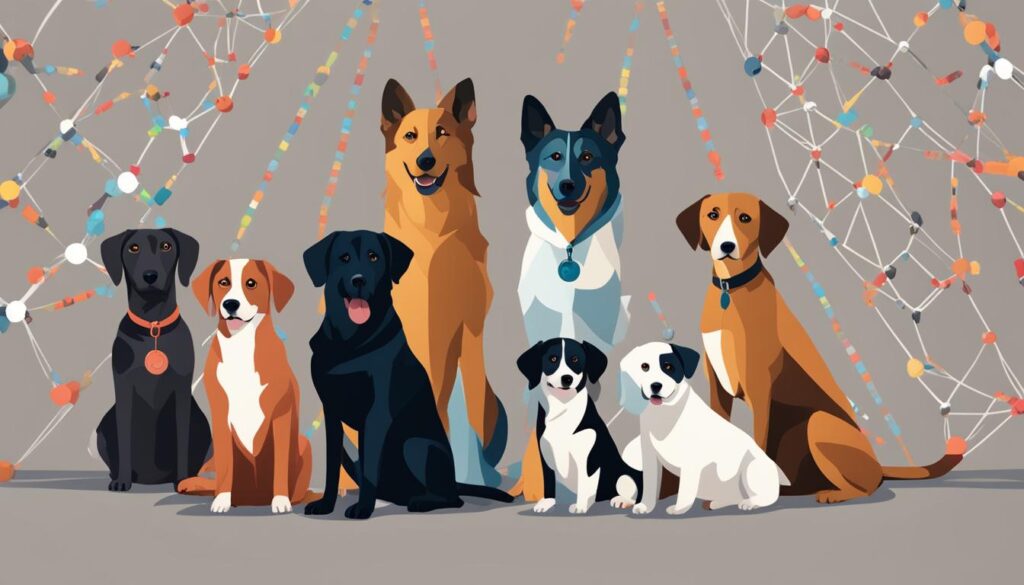Welcome to our fascinating exploration of the influence of genetics on canine behavioral traits! Dogs are known for their unique personalities, but have you ever wondered why certain breeds exhibit specific behavior traits? In this article, we will delve into the world of genetics and dog behavior, uncovering the genetic factors that contribute to breed-specific behavior in our beloved four-legged friends.
Before we dive into the details, let’s take a moment to appreciate the complexity of canine behavior. Understanding the genetic underpinnings of behavior requires large datasets and validated tools such as the Canine Behavioral Assessment and Research Questionnaire (C-BARQ). Through these tools, dog owners can assess their furry companions’ personality traits and gain insights into the role genetics play in shaping their behavior.
Now, let’s embark on our exciting journey to unravel the genetic mysteries behind your dog’s unique behavior traits. But before we proceed, let’s take a moment to visualize what we’re talking about. Here’s an adorable image of a dog exploring the great outdoors:
Key Takeaways:
- Genetics plays a significant role in shaping canine behavior.
- Differences in behavior traits can be observed between different dog breeds.
- The Canine Behavioral Assessment and Research Questionnaire (C-BARQ) is a valuable tool for assessing dog personality traits.
- Understanding the genetic basis of behavior can inform breeding and training practices.
- The interplay between genetics and the environment is crucial in managing and training dogs.
The Genetic Architecture of Canine Behavior
The behavior of dogs is influenced by a combination of genetic and environmental factors. While environment plays a significant role, there is evidence to suggest that genetics also have a strong influence on canine behavior. Breed-specific differences in behavior indicate a genetic component to temperament and personality traits. Understanding the genetic architecture of canine behavior is crucial for effectively managing and training dogs.
In terms of aggression, certain breeds are more prone to aggressive behavior than others. This can be attributed to genetic factors that contribute to the breed’s predisposition. It is important for dog owners and trainers to be aware of these genetic factors to better understand and manage aggression in dogs.
“Genetic factors have been implicated in dog aggression, with certain breeds being more prone to aggressive behavior than others.”
Research has shown that behavior traits in dogs are polygenic, meaning they are influenced by multiple genes, each with a small effect. This complexity highlights the need for large datasets and genomic analyses to identify the specific genes involved in shaping behavior. Genome-wide association studies (GWAS) have been used to identify genetic variants associated with specific behavioral traits, providing valuable insights into the genetic basis of behavior. This information can be used by breeders and trainers to better understand and manage certain behaviors in dogs.
| Breed | Temperament | Aggression |
|---|---|---|
| Golden Retriever | Friendly, Gentle | Low |
| German Shepherd | Loyal, Protective | Medium |
| Pit Bull | Strong, Energetic | High |
| Beagle | Curious, Friendly | Low |
Influence of Breed on Dog Temperament
Each breed has its own unique temperament traits, which are a result of genetic factors. Breed-specific instincts and predispositions can greatly influence a dog’s behavior. For example, herding breeds may exhibit a strong instinct to chase and nip at moving objects, while hunting breeds may be more likely to exhibit high prey drive. Understanding these breed-specific tendencies can help owners and trainers tailor their approach to training and behavior modification.
Genetic Factors in Dog Aggression
Aggression in dogs can be influenced by genetic factors. Certain breeds have been selectively bred for traits such as territoriality and protectiveness, which can contribute to a higher likelihood of aggressive behavior. However, it is important to note that genetics alone do not determine behavior. Environmental factors, including socialization, training, and handling, also play a significant role in shaping a dog’s behavior and can either mitigate or exacerbate genetic predispositions.
Breeding and Behavioral Traits: Understanding the Role of Genetics in Canine Personality
When it comes to understanding the behavior of dogs, it is essential to recognize the influence of genetics. Studies have shown that certain behavioral traits in dogs are moderately heritable, meaning they can be passed down from parent to offspring. This information is valuable for breeders and owners as it helps them make informed decisions regarding breeding practices and training techniques.
Genetic predispositions in dog behavior can greatly impact an individual’s personality. By selectively breeding dogs with desired behavioral characteristics, breeders can influence the expression of specific traits in subsequent generations. This knowledge is particularly important for breeders aiming to produce dogs with predictable temperaments and abilities.
Furthermore, understanding the role of genetics in canine behavior provides valuable insights into the potential challenges owners may face. By recognizing breed-specific tendencies and genetic predispositions, owners can better tailor their training approaches to ensure the well-being of their dogs. Additionally, this knowledge can contribute to the development of targeted behavior modification and training techniques that take into account the genetic factors influencing an individual dog’s behavior.
Table: Common Behavioral Traits and Their Heritability Estimates
| Behavioral Trait | Heritability Estimate |
|---|---|
| Aggression | 0.45 |
| Trainability | 0.35 |
| Barking tendency | 0.40 |
| Sociability | 0.50 |
As the table above illustrates, common behavioral traits such as aggression, trainability, barking tendency, and sociability have heritability estimates ranging from 0.35 to 0.50. These estimates indicate the proportion of variation in a particular trait that can be attributed to genetics. By understanding the heritability of specific behavioral traits, breeders and owners can make informed decisions to promote desired behaviors and manage potential challenges.
While genetics play a significant role in shaping canine behavior, it’s important to note that environmental factors also contribute to an individual dog’s personality. Factors such as upbringing, socialization, and training all play a crucial role in determining a dog’s behavior. By considering both genetic predispositions and environmental influences, breeders and owners can create a favorable environment for their dogs to thrive and exhibit balanced behavior.
Understanding Breed-Specific Instincts and the Role of Genetics in Training Dogs
When it comes to canine behavior, understanding breed-specific instincts and the role of genetics is crucial for effective training and management. Dogs have been selectively bred for centuries, resulting in distinct breed characteristics and behaviors. These breed-specific instincts are rooted in the genetic makeup of each breed and can greatly influence a dog’s behavior.
Genetics play a significant role in shaping behavior traits such as herding, retrieving, guarding, and hunting, which are often specific to certain breeds. For example, Border Collies are known for their herding instincts, while Labrador Retrievers excel in retrieving. By understanding these breed-specific instincts, trainers and owners can tailor their training methods to harness and channel these natural tendencies in a positive way.
Genetics provide the foundation, but it’s important to remember that a dog’s behavior is also influenced by environmental factors such as socialization, training, and upbringing.
However, it’s important to note that genetics alone do not determine a dog’s behavior. Genetics provide the foundation, but it’s important to remember that a dog’s behavior is also influenced by environmental factors such as socialization, training, and upbringing. Even within a specific breed, individual dogs can display variations in behavior due to their unique experiences and environmental influences.
By combining an understanding of breed-specific instincts with effective training techniques and a positive environment, owners and trainers can help shape a dog’s behavior in a way that is appropriate and desirable. This holistic approach, taking into account both genetics and environment, is key to achieving successful behavioral outcomes in dogs.

Breeds Prone to Certain Behaviors and Genetic Behavior Modification in Dogs
Breeds of dogs can exhibit certain behaviors due to their genetic predispositions. Understanding these breed-specific tendencies can help dog owners and trainers anticipate and manage behavioral challenges effectively. Genetic behavior modification, based on an understanding of the underlying genetics, can also be a valuable tool in managing and training dogs.
Common Behavioral Traits in Certain Breeds:
Knowing which breeds are prone to specific behaviors can assist in identifying potential challenges and implementing appropriate training strategies. Here are some examples:
| Breed | Prone Behavior |
|---|---|
| German Shepherds | Protectiveness, loyalty, and territorial behavior |
| Pit Bulls | Strong prey drive and potential aggression towards other animals |
| Border Collies | High energy levels, herding instincts, and need for mental stimulation |
| Beagles | Strong scenting and hunting instincts |
It’s important to note that these breed tendencies are not absolute and can vary among individuals. Each dog’s individual temperament and environment also play significant roles in shaping their behavior.
Understanding the genetic predispositions of certain breeds can help dog owners and trainers tailor their approach to behavior management. By being aware of the potential challenges associated with specific breeds, you can provide appropriate training, socialization, and environmental enrichment to promote positive behaviors and reduce the likelihood of problematic ones.
Genetic Behavior Modification:
Advancements in genetics have opened up new possibilities for behavior modification in dogs. By studying the genetic basis of behavior, researchers have identified specific genes and genetic variants associated with certain behaviors. This knowledge can be used to develop targeted interventions and training approaches.
- Pharmacogenetics: Genetic testing can help determine a dog’s response to medications used in behavior modification. This individualized approach ensures that the right medications are prescribed for optimal results.
- Behavioral Genetics: Understanding the genetic factors underlying behavior can guide the development of behavior modification protocols tailored to an individual dog’s genetic profile.
- Selective Breeding: Breeders can utilize genetic information to selectively breed dogs with desirable behavioral traits, helping to produce future generations with improved behavior.

Understanding Breed-Specific Instincts and the Role of Genetics in Training Dogs
When it comes to canine behavior, genetics play a crucial role. However, it is equally important to acknowledge the impact of the environment in shaping a dog’s behavior. While certain breeds may exhibit breed-specific instincts and predispositions, the way a dog is raised, socialized, and trained can greatly influence their behavior and personality.
Understanding breed-specific instincts is vital in effectively managing and training dogs. Different breeds have been selectively bred for specific purposes, such as herding, guarding, or hunting. These instinctive behaviors can manifest in various ways, from a Border Collie’s natural herding instincts to a German Shepherd’s natural protective instincts. Recognizing and harnessing these instincts can be beneficial in training dogs to excel in the roles they were bred for.
Genetics also play a part in determining a dog’s behavior and response to training. Certain genetic predispositions can make some dogs more receptive to training methods, while others may require more patience and tailored approaches. By understanding the role of genetics, trainers and owners can adapt their training techniques to suit the individual needs and temperament of their dogs, setting them up for success.
“Every dog is unique, and their genetic makeup contributes to their behavior. By considering breed-specific instincts and genetic predispositions, you can develop a training plan that takes into account their natural tendencies and sets them up for success.”
Table: Breed-Specific Instincts and Training Considerations
| Breed | Breed-Specific Instincts | Training Considerations |
|---|---|---|
| Border Collie | Herding instincts | Channel their energy into activities like agility or obedience training |
| Labrador Retriever | Retrieving instincts | Engage in activities such as fetch or participate in scent work |
| German Shepherd | Protective instincts | Fulfill their need for a job by participating in tasks like search and rescue or protection training |
| Beagle | Hunting instincts | Provide opportunities for scent-based activities or participate in tracking trials |
“Understanding and appreciating breed-specific instincts can help you tailor your training methods to cater to your dog’s natural tendencies. By working with their instincts rather than against them, you can build a stronger bond and achieve better results in training.”
By acknowledging both the genetic and environmental factors that contribute to a dog’s behavior, trainers and owners can create a holistic approach to training that considers the individual needs and characteristics of each dog. This comprehensive understanding of canine behavior allows for more effective training techniques and a better quality of life for dogs.
Remember, genetics provide a foundation, while the environment shapes the behavior. By understanding breed-specific instincts and the role of genetics in training dogs, you can develop a training plan that takes into account their natural tendencies and sets them up for success.

Breed Influences on Dog Personality and Genetic Behavior Modification in Dogs
When it comes to assessing and managing canine behavioral traits, it is crucial to consider the influence of breed and genetics. Different dog breeds exhibit distinct personality traits and behaviors, which can be attributed to their genetic makeup. Understanding these breed-specific tendencies can provide valuable insights for selecting, breeding, and training dogs.
Genetics play a significant role in shaping a dog’s behavior, and certain breeds may have genetic predispositions to specific behaviors. For example, some breeds are known for their herding instincts, while others may be more prone to aggression. By understanding the genetic basis of these behaviors, breeders and trainers can make informed decisions to produce dogs with desired temperaments.
Genetic behavior modification is another aspect that can be considered in managing canine behavioral traits. By understanding and identifying specific genetic variants associated with certain behaviors, it becomes possible to develop targeted training and behavior modification techniques. This personalized approach can be more effective in addressing specific behavioral issues and achieving desired outcomes.
| Breed | Personality Traits | Genetic Predispositions |
|---|---|---|
| Labrador Retriever | Friendly, Eager to Please | Low aggression, high trainability |
| German Shepherd | Loyal, Protective | Herding instincts, potential for aggression |
| Border Collie | Intelligent, Energetic | High herding drive, potential for OCD-like behaviors |
By recognizing the breed influences on dog personality and incorporating genetic behavior modification strategies, it is possible to optimize the training and management of canine behavioral traits. This holistic approach takes into account both the genetic predispositions and individual needs of each dog, leading to more successful outcomes in behavior management.
Conclusion
Genetics have a significant impact on canine behavior, contributing to both breed-specific traits and individual variations. Understanding the genetic predispositions in dog behavior is crucial for effective management and training. By considering the genetic architecture of behavior, breeders can make informed decisions to produce dogs with desired temperaments.
However, it’s important to remember that genetics alone do not determine behavior. The environment also plays a vital role, influencing a dog’s upbringing, socialization, and training. Breed-specific instincts and predispositions further shape a dog’s behavior.
To better manage canine behavior, a comprehensive approach that combines genetic considerations with environmental factors is necessary. Further research and the analysis of large datasets are needed to identify the specific genes involved in shaping behavior and to develop effective strategies for behavior management.
FAQ
What role does genetics play in shaping canine behavior?
Genetics play a significant role in shaping canine behavior, with evidence of between-breed differences and within-breed variation. Certain behaviors have been shown to be heritable, meaning they are passed down from parent to offspring.
How can understanding the genetic basis of behavior help in breeding and training practices?
Understanding the genetic basis of behavior can inform breeding decisions, with breed-specific instincts and predispositions taken into account. It can also help trainers tailor behavioral modification techniques based on a dog’s genetic predispositions.
Are there specific genes that are associated with certain behaviors in dogs?
Genomic studies have identified specific genetic variants associated with certain behaviors in dogs. However, behavioral traits are polygenic, meaning they are influenced by many genes, each with a small effect.
What other factors besides genetics contribute to a dog’s behavior?
While genetics play a significant role, the environment also has a substantial impact on a dog’s behavior. Factors such as upbringing, socialization, and training can greatly influence a dog’s behavior and personality.
How can breed-specific tendencies be considered in managing canine behavior?
Breed-specific instincts and predispositions should be taken into account when selecting, breeding, and training dogs. Understanding these tendencies can help manage and train dogs more effectively.
What are some strategies for assessing and managing canine behavioral traits?
Assessing and managing canine behavioral traits involves considering both genetic and environmental factors. Breed-specific tendencies, genetic predispositions, and the interplay between genetics and environment should be taken into account.





